Introduction
I think I saw the question somewhere here on the forums, though I don’t remember the thread: How can a casino fail?
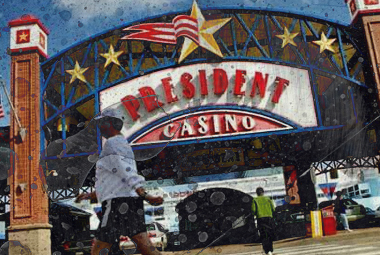
There are any number of potential answers to this question, so we will try to identify a few. The prevailing assumption seems to be that casinos are somehow different from other businesses because they offer a variety of gambling options to players, all with various house edges and everyone knows that the players will lose money one and all if they play long enough. There are exceptions for advantage players, but a casino could theoretically make any advantage play impossible.
Direct Competition
Let’s look at the President Casino Laclede’s Landing, a reasonable sized casino that was located in St. Louis, Missouri, that closed in 2010.
The property was owned by Pinnacle Entertainment, as was the Lumiere Place at that time. Pinnacle Entertainment would go on to build the River City Casino in Lemay; a suburb of Saint Louis. It is very likely that they would go on to realize that the self-competition was too much and they had diluted their own market share by opening another casino. The same thing happened to Atlantic City casinos owned by Donald Trump, which is detailed more fully in my People in Gambling-Donald Trump article.
The Ameristar St. Charles also opened in 2008. St. Charles is a suburb of St. Louis located just to the west, so that also diluted the market somewhat. At one point, it was announced that Pinnacle Entertainment was going to move the President Casino elsewhere, but that did not materialize. There simply wasn’t going to be anywhere in the area where they could capture enough market share to justify a casino.
In addition to when Trump had a big share of the market, this would repeat itself in Atlantic City during the Great Recession as several casinos would close within a few years of one another. That market oversaturation was exacerbated by the building of the Revel, which itself would become one of the closed casinos during that time.
The simple fact is that you cannot just plop a casino down anywhere and have it be guaranteed to be profitable. As with any other business, it is subject to the vagaries of competition and economic conditions.
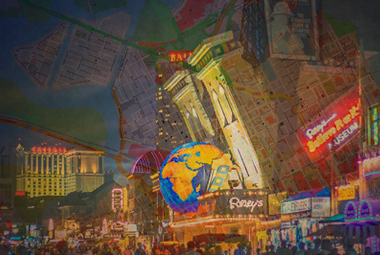
Indirect Competition
During the Great Recession, Atlantic City’s loss of visitors would be exacerbated by an expanding casino environment outside of the state. Within the 10-15 years preceding, full casino gaming (machines and tables) would be legalized in Pennsylvania, Ohio, West Virginia, Delaware and Maryland.
While this competition was less direct, it did have the effect of diluting Atlantic City’s market share because people no longer had to travel to Atlantic City or Las Vegas in order to gamble. There are any number of people who would rather go to casinos several times a year rather than save up for a big trip or two. That becomes especially true for those only going to Atlantic City for the casinos who may not have been as interested in the ocean or shopping activities.
Another key difference between Atlantic City (and this has happened to smaller degrees elsewhere) and these new casinos were that the new casinos could be built to be right-sized. The casinos in Atlantic City were gargantuan in size and scope as they were built under the assumption that Atlantic City would be the only casino destination on the East Coast (not counting the tribal casinos-Foxwoods and Mohegan Sun-in Connecticut) basically in perpetuity. How could they have imagined that all of these other states would ultimately license commercial casinos?
Let’s compare the square footage of the gaming area for the (still open) Atlantic City casinos compared to those in Pennsylvania:
- Resorts-100,000
- Bally’s-225,756
- Borgata-161,000
- Caesars-145,000
- Golden Nugget-74,252
- Harrah’s-160,000
- Tropicana-125,935
- Hard Rock (then Trump Taj Mahal)-167,000
In comparison, the casinos in Eastern Pennsylvania:
- Harrah’s-106,100
- Parx-150,000
- SugarHouse-45,000
- Valley Forge-40,000 (I’m surprised it’s that big, doesn’t look like it)
In addition to that, Sugarhouse does not have a hotel of its own. As anyone can see, the average size of the casinos is no contest and the casinos in Pennsylvania are much more spread out, to take advantage of the different local markets. Atlantic City enjoys no such advantage as it was built to be THE casino city for the Eastern half of the United States.
Anyway, these casinos enjoy the advantage of being built to be right-sized for the market, additionally, they enjoy the advantage of being built to appeal to different types of clientele and, in some cases, locals.
This less direct competition does not just impact Atlantic City. For all casinos in a state that have a bordering state that does not have casinos, commercial gambling being legalized (and casinos being built) is a potential threat to the core customer base. It’s for that reason that the majority of new casinos that are built are not the massive monoliths that we see in Atlantic City or Las Vegas, with a few exceptions.
Variance
In addition to the potential for competition, there is some variance as external economic factors can impact the casino environment, particularly for destination cities. That was part of the problem that impacted Atlantic City a few years back with the Great Recession.
New Orleans and Mississippi casinos were impacted by a totally different factor altogether in the mid-2000’s. Several casinos in that area closed as a result of being completely destroyed by Hurricane Katrina. Even where these casinos were replaced, the owners saw the increased competition in the region and would, on occasion, build a casino that was more right-sized for the customer base.
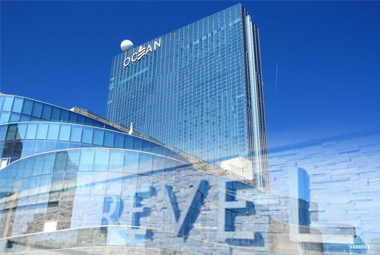
How Do You Build?
Another factor in casinos closing is how those casinos were built or purchased.
It’s funny to hear people talk about individual financial responsibility whilst ignoring the fact that so many companies get in over their heads with loans that they cannot pay. A great example of this is the Revel, which was ultimately bankrupted and sold for a very small fraction of its building costs. Had the casino been built with outright cash in hand, then it is possible that it would have the proper amount of time to find their footing from a management and player development standpoint, and ultimately, weather the storm of negative revenue performance.
Unfortunately, due to their debt load, the casino would only enjoy one profitable month in their brief history. That came largely as a result of offering a $100,000 loss rebate, so much of that money would have went back to the players in the following months anyway.
The simple fact is that the Revel was dead in the water (well, by the water) due to their tremendous debt load as they had to finance the building of the casino at high interest rates.
Again, referring back to the Trump article, the same thing happened in Atlantic City at that time. Trump built his tremendous casinos while incurring tremendous debts that had to be refinanced, and in a couple of cases, the casinos would file for bankruptcy.
One of the problems that major casino companies face is the fact that they cannot file bankruptcy on a single property. The result is that underperforming properties much either close or remain open if the cost to close them would be greater than what they lose by way of operating. These major companies may also be carrying a greater debt load than can be managed.
That happened with Caesars Entertainment as they would sell off several properties in the 2010’s, perhaps most notably their Ohio properties to Dan Gilbert, just to get some cash in order to meet their debt maturities.
We see now that El Dorado Resorts has now agreed to purchase Caesars Entertainment in a deal expected to finalize in 2020. El Dorado, which has an outstanding balance sheet, has been actively selling several of its properties in order to help finance the Caesars acquisition. If that doesn’t end up being enough, then it is likely that they will need to take on additional debt.
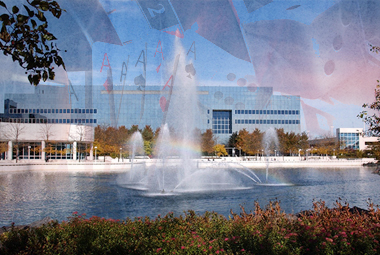
Once again, this is no different than any other industry. At one point in time, both Sears and Kmart were retail giants who looked as though they could never fail. Eventually, megastores such as Walmart and Target would come into being (competition) and revenues would plummet at same stores that faced the direct competition.
Sears in particular had a lot of exposure in the realm of physical enclosed malls, but consumer attitudes changed and such malls began to fall out of favor and many of those themselves closed. The internet also played a big factor in the downfall of Sears and Kmart (and likely, JCPenney really soon) as people could purchase the stuff that they sold in a manner they preferred and have it delivered right to their house.
Of course, JCPenney and Sears were in big trouble even before Amazon became a huge thing.
To hear Eddie Lampert (former Sears Holdings CEO) tell it, he did everything he could to save the combined company. Kmart (which Lampert largely controlled) would purchase Sears and the debt load for the combined entity was astronomical. The result was not only increased competition, but also very limited funds to update the two chains of stores. The fact is that many Sears look like a department store from the early-1990’s, because that is the most recent time they were significantly updated.
Eddie Lampert would play some real estate games with the combined properties, selling the stores physical locations to a Real Estate Investment Trust (REIT) that he controlled, Seritage Properties, and then leasing those very same stores back to Sears and Kmart. In the short-term, the sales would give the combined Sears Holdings some cash to meet their minimum debt obligations.
In the long run, the leases would have ended up costing the combined entity in the end, had the stores made it that far. Again, the stores were paying to lease themselves from the REIT, so money was still going out. There was a lengthy court battle regarding all of these activities that is still open to some extent, so feel free to read about that.
In any case, it’s much easier for a company to survive when it is not carrying an astronomical debt load (obvious) because even if it has positive operating revenues, that does not always translate to positive net income.
Once again, casinos are no different. If casinos finance their building operations or purchases of properties, then they must not only at least breakeven on their operations, but sooner or later, have to have positive operating revenues to meet the debt load. An individually owned casino can just file bankruptcy and call it game over, but it gets more complicated when a bunch of casinos are tied to the same corporation.
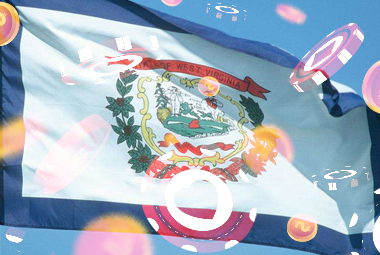
The Taxman Cometh
In addition to these problems, it must also be recognized that casinos pay astronomical taxes on all of their gambling revenues. These can vary by state, but one great example according to UNLV:
Is the state of West Virginia, which can charge casinos anywhere from 35-49% taxes on adjusted gross gambling revenue.
The states care about one thing and one thing only, and that’s getting paid. It’s pretty much immaterial to the states whether or not a casino is profitable provided it at least makes enough to stay open. It’s also important to remember that these are a tax on revenues as opposed to profits. If a player loses $100 to a West Virginia casino, the state of West Virginia gets $35-$49 regardless of how the casino is performing financially overall.
It is also because of that casinos in such states tend to have poorer slot returns and poor video poker paytables. For example, Nevada has an effective casino tax rate of 7.75% on revenues, so they pay $7.75 for every $100 won from players.
The casino gets to keep $92.25 of that, whereas the West Virginia casino needs to have revenues, at minimum, of over $140 in order to actually keep the same amount. The simple fact of the matter is that some players will hit a decent win and stop playing, and that happens everywhere, so the West Virginia casinos simply need to extract more money from the players who are not hitting such wins.
This may seem like a disservice to the players who have to absorb these bad paytables to meet the tax costs to the casino, but again, the states don’t care about that at all. They want money. In West Virginia, there’s also the Greyhound Breeders Fund by which a casino has to pay an additional percentage of its revenues in order to finance the greyhound industry, which otherwise would have completely failed in the 90’s, and preserving the same was the reason that the casinos were built in the first place.
Video gambling in Illinois is not quite as bad, but still more than four times what Nevada charges with a tax rate of 30% on those revenues. In Pennsylvania, sports betting revenues are taxed at 36% while video gaming is taxed at an effective rate of fifty-five percent!!! More than half of the revenues from the slots and video poker are paid to the state via taxation.
Pennsylvania and West Virginia are tales of two very different states in this regard. West Virginia has legal, “Parlors,” which are establishments permitted to house as many as seven machines (ten for non-profit organizations) and these establishments are all over the place. I spoke to the owner of one once and was told, “All I need is to win two paychecks a week. (to be profitable).”
Pennsylvania has no such parlors, at least not yet, but the markets kind of manage themselves by way of avoiding oversaturation. That’s why you’ll never see the equivalent of Las Vegas or Atlantic City sprout up in the state; it would dilute the market too much. It’s kind of like how you’ll never (or very rarely) see a Spencer’s and a Hot Topic in the same mall, they appeal to the same limited market. For Pennsylvania, non-dilution of the market is key to survival given the percentage that they are paying to the state.
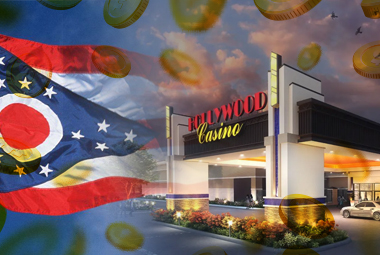
The tax rate on casino revenues in Ohio is set at 33%. Similar to Pennsylvania, the Ohio casinos are spread out so as not to dilute their market. The two casinos/racinos in the state that are closest to one another are the Hollywood Casino (Penn National Gaming) and Scioto Downs (El Dorado Resorts) both located in Columbus, Ohio. Those two properties are thirteen miles away from one another in a major city.
This all gets back to not only right-sizing the casinos themselves, but also to right-sizing the number of casinos in a market such as to not dilute market share. Examples of other states that do the same are Missouri and Maryland, among others.
It wasn’t so much that the Atlantic City market was unsustainable when it came into being, just that it became unsustainable as time passed and competition increased. If Kentucky ever gets around to legalizing and regulating commercial casinos, then the properties in the Cincinnati, Ohio area may find themselves in some trouble. Of course, they may have already been built to a scope that prepared for this possibility.
Failure Begets Failure
Things were looking bad for Wheeling Island Hotel, Casino, Racetrack prior to the gas boom that would see increased economic activity in the region due to the Utica and Marcellus shales. For quite some time, they had a lock on the tri-state area when it came to having any form of casino gambling available for residents. Located just off of Interstate 70, Wheeling Island enjoyed a long period of being the only slot action in the tri-state, and a much briefer period of being the only casino with table games.
Along came Meadows Casino in Washington, PA (near Pittsburgh) as well as Rivers Casino, located in the North Shore of Pittsburgh to cut out a major feeder city to the casino. Things would go from bad to worse as Ohio would go on to open Hollywood Casino in Columbus, put slot machines at Scioto Downs (originally just a harness racing track) as well as open the then Horseshoe (now JACK) casino in Cleveland.
The casino itself was not the only entity to notice the change. It perhaps goes without saying that the local hotels would see the number of visitors from these three major cities plummet after these competing casinos opened.
In addition to that, Wheeling Island was a worse casino for players in many ways. For one thing, the Ohio properties (while average by casino standards) were absolutely gorgeous in comparison. The Meadows, while far from a visually stunning property, offered a wide variety of machines, a MUCH larger and nicer poker room and gave away beer. For whatever reason, Wheeling Island did not wish to compete as regards the free alcohol, even though they are legally permitted to do so. They continued to only offer free alcohol to high-limit slot room players and holders of the highest-tier players card, which continues to this day.
Any of these casinos (barring Scioto Downs, which could not have video poker) made Wheeling Island look like a joke (and still do) when it comes to video poker offerings. They placed machines that former Wheeling Island players had never even seen before, with any number of video poker variants located at those properties to this day.
Additionally, all casinos (again, barring Scioto Downs) had a wide variety of different table games, where Wheeling Island has only had anywhere from five-seven different games at any given time. The table games areas were more expansive, and both Rivers and Meadows had proper poker rooms, Cleveland and Columbus did too, but I happen to know that most of the Wheeling Island poker players started frequenting mostly Rivers and Meadows.
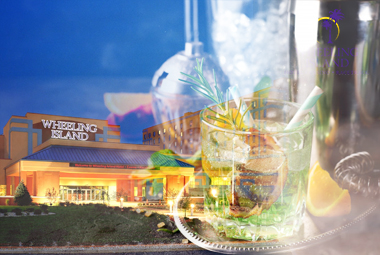
It was almost as though Wheeling Island knew it was done for. They didn’t even try to compete for players (new video poker games, free drinks) and would often close table games earlier and earlier every night. The fact of the matter is that they were failing to retain many of the customers who would have otherwise preferred to go to Wheeling Island. They would go to the casino to see the poker room closed, their table game of choice closed and then give up and stop going back.
In many cases, losing a table game player also means that you are losing a highly profitable slots player, as couples will often come together. One plays slots and the other plays table games. Aside from the bells and whistles, the shouts of joy that come from a Craps table when a shooter is on a hot streak, the whoops from blackjack players who get dealt a natural when putting out a big bet...most of this was gone and replaced by silence. If you were playing a slot machine, you could hear another one three rows away clearly...not ideal.
Wheeling Island must not be doing that well as they are still very much focused on cost control. Table games are often Blackjack only for several hours of the night and into the morning, one table, only because they are required to operate around the clock in order to have their electronic craps and roulette machines. The poker room, which is really more like a poker corner, is closed more often than not. The buffet is closed completely on Mondays and Tuesdays and the full breakfast buffet has been replaced by something more akin to a continental breakfast.
Wheeling Island is both a victim of competition and a victim of themselves. Failure begets failure. A memorable quote from the 90’s movie, American Beauty, is something along the lines of the biggest part of success is to project an image of success. The image that the casino projects is dismal and so are the results.
As you can see by the graph on Page 8:
The revenues plummeted, as would be expected, in the face of this new competition. However, the casino has since found a little bit of stability.
They also face competition locally from the limited video lottery establishments, but as we discussed before, the state just wants money at the end of the day. They have no reason to be beholden to Wheeling Island Casino specifically.
We also see that table game revenues took the biggest hit at Wheeling Island as compared to Mountaineer and have never been close to recovery. Failure begets failure. Additionally, a beer at The Meadows is $0.00 and the cheapest beer at the Island is almost five bucks. The dealers and supervisors are very friendly and are doing their best, but you can see that the casino itself is not doing its best. It’s just happy humming along and taking whatever it can get on the tables.
Conclusion
Hopefully this article has shed a little bit of light on how casinos end up closed, or on the cusp of closing, despite the fact that it seems like a foolproof enterprise.
We touched on many of the reasons for this and there were even a few that we skipped over. For one thing, Caesars Entertainment essentially competes with itself in Atlantic City and that’s why the (profitable) Showboat ended up closing. With the Total Rewards program, Caesars apparently felt that they could divert the Showboat clientele to their other properties in a way that would be more profitable for the company overall.
An economic tragedy similar to the Great Recession could also spell trouble for Las Vegas area casinos as well as the remaining Caesars properties in Atlantic City. These areas still rely heavily on tourism, but tourism takes money and more people have money in a strong economy. As with the Showboat case, many of the casinos in these areas are essentially self-competing. We also saw that in St. Louis with the properties formerly owned by Pinnacle Entertainment.
The bottom line is that casinos are a unique business simply by virtue of the fact that they have a focus on gambling. Aside from that, they are essentially the same as any other business and can find themselves out of business due to very similar factors.
Comments
Complacency can be costly. Bad dealers often rise to management levels and focus on the cost of keeping a table game table open without any thought at all about a slot-playing spouse or a toke-hungry dealer. Greedy legislators focus on revenue, not the viability of the business entity which might provide sustained revenue albeit at a lower rate. Did bankers and casino investors never look at a map during the planning stages?
Sure looking back in time can give us 20/20 vision but one has to wonder just how people could have had such cloudy vision when they were making serious errors.
Good point about too much cost focus and not enough on the simple principle of attracting players. It seems like many of the casinos of old did well-enough just by being player-friendly and mostly letting the rest take care of itself.
The Legislators are definitely a problem focusing on taking such a huge cut and painting casinos into a corner such that they cannot be competitive from a player value standpoint. Of course, this hardly comes as a surprise, when one considers that many casinos only exist in states as a result of the state either being desperate for revenues or (begrudgingly) permitting casino gambling to save horse or greyhound racing industries that would have otherwise failed years or decades ago.
The bankers don't necessarily worry because it's all in the name of diversification, anyway. Besides that, maybe they are looking at casinos as just being business entities who can't fail, despite historical evidence to the contrary...especially in the case of record cost casinos. That seems to happen over and over again.
"one great example ... Is the state of West Virginia, which can charge casinos anywhere from 35-49% taxes on adjusted gross gambling revenue."
thanks, I've been wondering how much squeeze the state was getting. I do wonder what "adjusted" means. I found definitions of Gross Gaming Revenue at the link below, best one due to simplicity maybe being:
" Gross Gaming Revenue or "Win" shall mean the net win from Gaming activities which is the difference between Gaming wins and losses [i]before[/i] deducting costs and expenses, determined in accordance with GAAP (generally accepted accounting principles)consistently applied. "
Emphasis mine. This I would say is roughly equivalent to the concept of gross profit in most other businesses, which means the profit for selling an item after deducting the cost of bringing it in and ignores all else, such as rent, salaries, etc.
Taking a chunk of that instead of just a piece, to put it that way, imposes on a business a monumental challenge. 35-49%? Wow, especially that 49%, let's just say "half". I think I can say it is why I feel I can notice some kind of odd attitude going to WV casinos. And you see it undeniably with the difficulty of even finding the video poker, they try to hide the machines, typically, and when you find them the paytables are awful.
https://www.lawinsider.com/dictionary/gross-gaming-revenue
you have to know what [i][/i] means I guess, I keep forgetting that such doesn't work in 'comments'
The adjusted is a bit confusing in the case of West Virginia, because it's not a flat tax amount. If you would like to start the morning with a migraine, then you can try to work out what they have on the lottery report here:
https://wvlottery.com/wp-content/uploads/2019/01/2018AnnualReport.pdf
Starting with Page 29.
Basically, the bottom line for the casinos themselves is that they get 46.5% and 42%. They get to keep 46.5% of the revenues until they hit the total video lottery revenue numbers of fiscal year 2001, at which point the casino's cut drops down to 42%. UNLV is apparently not counting the Greyhound Breeders Development Fund percentage as a tax against the casinos, which it effectively is. It's not all that different from PA at 55% at the end of the day.
Keep in mind that they have not even TOUCHED one other expense or tax (property tax, B&O tax, income tax) and have already had well over half their net revenues clipped.
It ends up being substantially more than half in total tax output at the end of the day and that's before they've even paid anybody.
As far as VP, I'm not so quick to make excuses for them. Pennsylvania casinos pay an effective rate of 55% on their video poker and most of them have all kinds of different games and a few give away drinks. More than that, you can find a few 98%+ and even the occasional 99%+ VP game in Pennsylvania if you look around enough. A few of these are not on VPFree2, though, and I'm no putting them there. I politely request anyone reading this not put them there either.
I was just kidding about the migraine, though I definitely needed my coffee for that. I had to read it three times before I could make sense of what the bottom line was.



